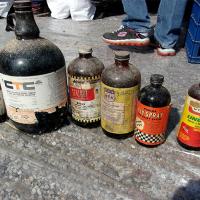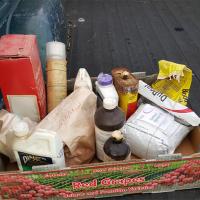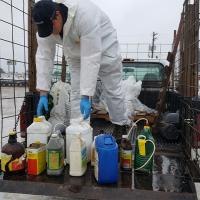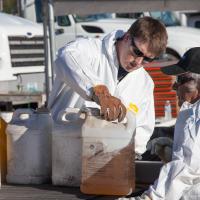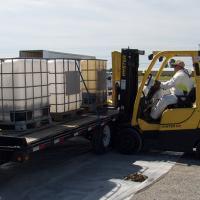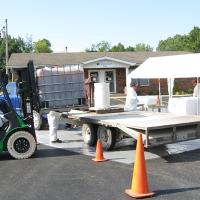The mission of the Missouri Pesticide Collection Program is to help protect human health and the environment by collecting and ensuring safe disposal of waste pesticides from Missouri farmers and households, while educating Missouri citizens about how to properly manage and reduce pesticide waste.
The Missouri Pesticide Collection Program is a non-regulatory, consumer services program that is part of the department's Waste Management Program. The program began in 2012, as a way to provide Missouri farmers and households with a convenient, free opportunity to properly dispose unwanted waste pesticides. All pesticides collected during the event are categorized, sampled (if unknown), separated and placed into proper Department of Transportation shipping containers with approved labels and markings. The waste is transported off site by a licensed hazardous waste contractor to a permitted hazardous waste incineration facility for disposal.
For more information or questions about the Missouri Pesticide Collection Program, please contact the department's Waste Management Program or email pesticidecollectionregistration@dnr.mo.gov. Hearing and speech-impaired individuals may reach us through Relay Missouri at 800-735-2966.
Upcoming Events
Past Events
| Year Sort ascending | Location | Number of Participants | Total Pounds |
|---|---|---|---|
| 2025 | Chillicothe | 39 | 11,560 |
| 2025 | Perryville | 43 | 20,951 |
| 2025 | Shelbina | 34 | 7,431 |
| 2025 | Lockwood | 18 | 9,909 |
| 2024 | Montgomery City | 45 | 16,021 |
| 2024 | Mount Vernon | 13 | 16,156 |
| 2024 | Carrollton | 27 | 5,812 |
| 2024 | Portageville | 40 | 42,870 |
| 2023 | Jamestown | 23 | 7,754 |
| 2023 | Troy | 33 | 13,700 |
| 2023 | Crane | 22 | 2,569 |
| 2023 | Brookfield | 16 | 12,393 |
| 2022 | Versailles | 32 | 15,859 |
| 2022 | Chillicothe | 47 | 15,441 |
| 2022 | Farmington | 24 | 7,162 |
| 2022 | Washington | 77 | 12,983 |
| 2022 | Appleton City | 31 | 8,839 |
| 2022 | Portageville | 35 | 96,766 |
| 2021 | Kennett | 25 | 73,954 |
| 2021 | Marthasville | 82 | 12,419 |
| 2021 | Kahoka | 13 | 5,217 |
| 2021 | Salisbury | 26 | 5,495 |
| 2021 | Lincoln | 20 | 2,293 |
| 2021 | Lockwood | 33 | 12,757 |
Accepted Waste
What is accepted?
All pesticides from Missouri farmers and households, including, but not limited to:
- Fungicides
- Herbicides
- Insecticides
- Rodenticides
- Fertilizers containing pesticides
- De-wormers and fly-tags
What is not accepted?
- Pesticides from businesses, pesticide production facilities, pesticide distributors or pesticide retailers
- Non-pesticide waste, including, but not limited to:
- Paint
- Explosives
- Fire Extinguishers
- Smoke Detectors
- Cylinders
- Asbestos
- Trash
- Yard Waste
- Electronics
- Used oil
Non-pesticide waste brought to the event will be rejected and sent back with the participant. For disposal information about non-pesticide household hazardous waste, such as paint and cleaning products, visit Household Hazardous Waste.
Who Can Participate
Collection services are overseen by the department’s Waste Management Program staff. Missouri Pesticide Collection Program events are open to the following:
- Missouri farmers
- Missouri households
Please call before bringing bulk containers of pesticide. There also are a few precautions you should take to prevent accidents from occurring on your way to the pesticide collection event, as you are responsible for your waste pesticides until delivered to the collection site. For more information, review the department's How To Safely Transport Your Waste Pesticides - PUB2934 fact sheet.
Resources
Documents
- How To Safely Transport Your Waste Pesticides - PUB2934
- Managing Pesticide Waste - PUB2596
- Pesticide Container Management - PUB2727
- Pesticide Rinsate Management - PUB2870
- Reducing the Impact of Flooding: Agricultural Chemicals - PUB2498
- Standard Operating Procedures for Waste Pesticide Collection Programs in Missouri Under the Universal Waste Rule - PUB2637
Videos
Additional Sources
Popular Links
Navigation
- Sites and Regulated Facilities
- Investigations and Cleanups
- Long-Term Stewardship (LTS)
- Waste and Recycling Business and Industry
- Reduce, Reuse and Recycle
- Waste and Recycling Data and e-Services
- Waste and Recycling Financial Assistance Opportunities
- What We're Doing - Waste and Recycling
- Get Involved - Waste and Recycling
Contact Information
Waste Management Program
Division of Environmental Quality
P.O. Box 176
Jefferson City, MO 65102-0176
United States

